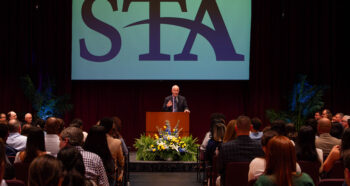In the current circumstances, things are a little different for university applications. Moreover, universities are teaching online and Cambridge International qualifications are awarded using a different approach. The UK is the most popular destination for Cambridge learners each year.
To help applicants, schools and families navigate the changes, Roshan Walkerley, Senior Recognition Manager at Cambridge International was joined for a podcast by Alex Dimmock, Head of Undergraduate Admissions at the University of Bristol and Emma Thomas, Senior International Officer at City University of London
The recording looks at issues such as English language requirements, additional measures that universities may put in place for those starting university this year, and advice for current A Level students.
Accepting June 2020 grades
Our conversation started by looking at how Cambridge International qualifications are accepted this year. Both universities stated they would accept final grades as usual and that they would wait for these final grades before confirming places for a September start. Emma notes: “we are treating the qualifications in exactly the same way as previous years”. “There may be some flexibility this year”, she added, saying that all current circumstances will be taken into consideration.
A clear message from many universities is the need to keep in contact with them and that applicants should look out for emails over the next few months.
English language requirements
We know a question for many learners globally is meeting English language proficiency requirements. Alex confirmed that Bristol University has “expanded the list of English qualifications they can accept” whilst Emma added, in line with many UK universities, that City University does accept Cambridge IGCSE English.
Many universities across the country have reviewed their requirements and have included new tests, some which may be taken at home (e.g. IELTS indicator) so we advise checking with universities directly to see what is possible this year.
Changes in teaching for September
The discussion then moved on to look at the start of the academic year and how teaching might change due to Covid-19. At Bristol, for example, Alex said that: “students might be able to select which option works best for them”. One option would be blended learning to accommodate social distancing, with online learning alongside in-person learning.
Meanwhile Emma said that at City University: “it is likely that the semester will start on time, but a variety of scenarios are being considered”.
We expect to hear more from universities in the next few months; many will likely take a blended approach, whilst others may allow students to complete the first term online and start the second semester on campus.
Course start dates
A question received from a Cambridge school was about options for starting courses in January 2021. In general, most UK universities only offer a September start for undergraduate (bachelors) courses but a small number have a January start too. Whilst most universities are focussing on a September start this year, some are considering a second entry in January, so students should check with universities directly if this is something they are interested in.
Health and wellbeing
For students who start a course this year, their “health and wellbeing are a priority for all universities”, notes Emma. She adds, “if there are going to be any health checks or similar, we will do all we can to communicate this”. For the Bristol perspective, Alex adds “we don’t yet know what we’ll need to enact, but we’ll put this information online and we’ll provide support with whatever is required”.
Clearing and visas
We moved on to discuss the results day in August and the UCAS clearing process. Both universities expect to have places available in clearing – the process by which unplaced students are able to apply when they have their grades. In 2020, students will be able to discuss their options with universities from Thursday 13 August onwards but any vacancies may be advertised a few days prior at www.ucas.com.
“We don’t yet know the exact situation for EU students starting in 2021”, notes Emma, when asked about visa requirements and tuition fees. However, under government guidance, “EU students may require a student visa from 2021 onwards for new starters”. A useful resource for international students looking into areas such as fee status and visa requirements is the UK Council for International Student Affairs.
Top tips
Finally, the panel shared their top tips for students. Alex added that they “know students won’t be able to do work experience at the moment and that at Bristol this is a requirement for some courses.” “We will take this into account and applicants won’t be penalised if their ability to gain work experience has been negatively impacted”, she adds. “I really want to reassure students who want to study in the UK to not be discouraged… we are doing everything in our power to enable students to come”. And finally from Emma, “we are completely understating of the situation and more than ever we are flexible.” She adds: “Universities are there to support you in any way possible… keep in contact with your choices, ensure you email address is up to date and attend virtual applicant days if you can”.
To find out more about the application process and key deadline for UK universities, visit www.ucas.com. A list of virtual open days is also available on the UCAS website. To discover where your Cambridge International qualifications could take you, as well as guides to studying in a range of countries, visit www.cambridgeinternational.org/recognition.





